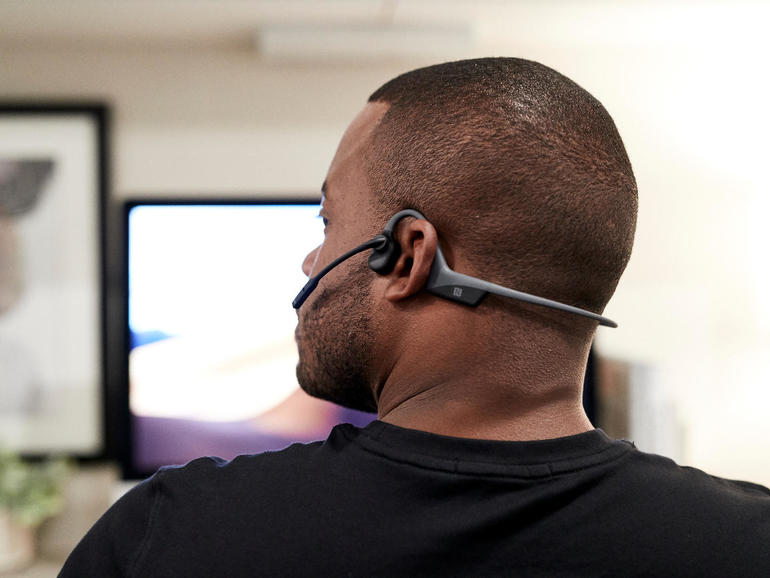The AfterShokz Trekz Air headset, see our review, is my ultimate headset for running since it allows my ears to remain unobstructed for safety purposes while providing great sounding music playback for many hours. That headset is extremely comfortable and has served me well for a few years.
Given the move to remote work due to the global pandemic and a focus on remote communication, AfterShokz’s newest OpenComm wireless headset is perfect for clear communication at your home, in the office, and on the road. It also uses bone conduction technology with a noise-canceling boom microphone designed to provide clear voice communication for meetings, conference calls, field work, and more.
Also: Trekz Air wireless bone conduction headphones: Run safer hearing your environment
I tested the AfterShokz OpenComm headset with a Microsoft Surface Pro 6, Apple iPhone 12 Pro Max, OnePlus 9 Pro, and Google Pixel Slate. The headset performed well with each device with the Surface Pro 6 being the worst due to Bluetooth connectivity issues. Since the headset worked flawlessly on the other devices, I’ll chalk that up to Microsoft and its Bluetooth support since that isn’t surprising given my experiences with other Bluetooth devices.
Specifications
Microphone: DSP noise-canceling boom mic with two micsWater resistance: IP55 ratingBattery life: Up to 16 hours of talk time or up to 8 hours of music listening. Quick charge provides up to two hours of use with five minutes of charging.Wireless connectivity: Bluetooth 5.0 and NFC for easy pairingHeadset weight: 33 grams
Hardware
The retail package includes the OpenComm headset, USB-A to magnetic induction charging end, and a silicone carrying case. The charger connects easily thanks in part to the strong magnets that help align and keep the charger connected.
The wraparound headset has a titanium frame and is coated in soft-touch silicone material with a matte finish. It looks great and is extremely comfortable for all-day wear. The battery and internal components are primarily housed in the two rectangular sections that are found adjacent to the curved area that goes around your ears.
Top ZDNET Reviews
The charging cable connects to the back of the rectangular section on the right side of the headset. On the underside of the right side are two orange buttons, + and -, for volume control. At the very end of the right side where the bone conduction piece is attached is another button for multi-function actions. On the gray headset I tested, this button is also orange color.
On the left side rectangular section, we see the universal NFC icon that designates where you tap to pair with an Android phone. There are no buttons or controls on the left side.
Out at the end of the left side is the DSP boom mic that rotates through about 270 degrees so you can have it back against the headset as it wraps behind your neck or all the way down and in front near your mouth. Rotating the headset does not mute your call or change any of the functionality of the headset. Microphone openings are found at the very end of the boom and on the outside of the boom about half an inch up from the end.
Also: AfterShokz Xtrainerz swimming headphones: Motivating you to keep going in the pool
A rigid, zippered carrying case is provided for the headset. On the right side of the case is a formed section for you to insert the headset for safe storage and carry. A soft net pocket is found on the left side so that you can carry the USB charging cable. The case has a professional look and a rigid design to keep your headset protected.
Button functionality
After charging up the headset, simply press and hold the volume up (+) button until you see the LED flash blue and red. Pair up your device and you are ready to go. The headset can be paired with two devices at the same time so you can switch between your computer and phone, for example.
The volume buttons are used to turn the headset on and off, pair the headset, mute/unmute calls, check battery status, and obviously control the volume of the headset.
There are many functions of the multi-function button found at the end of the right headset. Single, double, triple, and press and hold actions are used for play/pause, next/previous song, answer/end calls, activate voice assistant, and more. I recommend you read the manual for all functions and then through using all of the functions button controls will become second nature.
Daily usage experiences and conclusion
After using the Trekz Air headset for a couple of years, I am a true believer in the bone conduction technology for headsets when you want to keep your ears open to your environment. The $159.95 OpenComm wireless headset is a great option for those who want to keep their ears open while having an optimal voice experience too.
While the OpenComm has a high dust/water resistant rating, I did not use these during exercise or in inclement weather for this review. However, these would be good for field workers who make calls and want their ears open for safety in shipyards, warehouses, or other areas where there is a lot of other activity taking place.
I was very interested in the multipoint connection aspect since the headset is so comfortable that you can wear it all day without removing it and I wanted to connect to both my computer and my mobile phone. It is not intuitive to set this up without instruction so I highly recommend you read through these detailed instructions to take advantage of this feature.
Callers said I sounded good on the headset and participants sounded just fine on my end too. The all-day battery life, extreme comfort, and open-ear technology make this a favorite headset of mine. I’m not surprised by people coming up behind me while on a Teams call and the headset looks professional while on a video call too.



